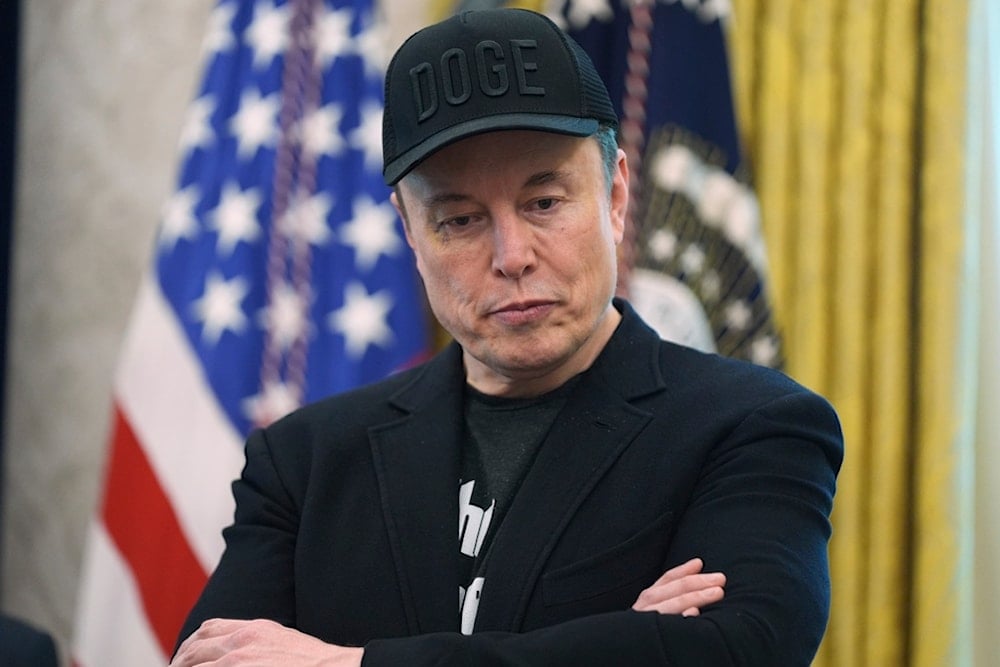Trump team rebuffed Musk’s request to extend govt. role: The Telegraph
The refusal has prompted Musk to attack Trump’s signature spending bill and spark Republican dissent over a proposal that could add $2.4 trillion to the deficit.
-

Elon Musk attends a news conference with US President Donald Trump in the Oval Office of the White House, Friday, May 30, 2025, in Washington (AP)
Elon Musk’s attempt to stay on in his official role within the Trump administration was rejected, according to two sources close to the billionaire, as revealed by The Telegraph.
Musk had served as a “special government employee” overseeing cost-cutting efforts but reached the end of his 130-day term last week. Despite requesting to remain and continue pushing for $1 trillion in federal spending cuts, the White House turned him down.
Musk was given an Oval Office send-off by US President Donald Trump, but his departure was soon followed by a fiery public critique of the administration’s flagship domestic legislation. Taking to his platform X, Musk called Trump’s new spending package a “disgusting abomination", triggering political aftershocks among congressional Republicans.
The bill at the center of Musk’s criticism is central to Trump’s second-term economic agenda. It includes permanent tax cuts and new tax breaks on tips and overtime pay. Yet critics, including Musk, have highlighted the Congressional Budget Office’s assessment that it would add $2.4 trillion to the national debt, already at a record $36.2 trillion.
“If the massive deficit spending continues,” Musk warned, “there will only be money for interest payments and nothing else—no Social Security, no medical, no defense … nothing.”
His comments drew immediate backlash from the Trump camp. A source described Musk’s behavior as “sour grapes", while another said administration officials were “disappointed” by the tone of his attacks.
Republican allies distance themselves from legislation
Musk’s intervention has exposed growing Republican unease with Trump’s spending bill. Representative Marjorie Taylor Greene said she would have voted against the measure had she known it barred states from regulating artificial intelligence for a decade, a provision she called a “violation of state rights.”
Her statement, though widely mocked for admitting she hadn’t read the bill, added to mounting concerns about the legislation’s contents.
Conservative commentator Matt Lewis noted that Musk and Greene had “created a permission structure” for Republicans to oppose the bill without directly challenging Trump, whose grip on the party remains strong.
Behind Musk’s grievances: Tesla, Starlink, and NASA
Multiple sources say Musk’s dissatisfaction stemmed not only from the spending bill but also from a string of policy setbacks. The legislation removes the electric vehicle tax credit that has benefited Tesla.
Meanwhile, Musk’s efforts to convince the Federal Aviation Administration to adopt his Starlink satellite system for air traffic control reportedly failed.
The final blow may have been the Trump administration’s decision to withdraw the nomination of a Musk ally to lead NASA.
Musk responded with a barrage of posts on X lasting well into the night, amplifying his dissatisfaction and fueling further dissent in Washington.
Fallout threatens Trump’s key economic plan
The White House has publicly downplayed Musk’s criticism. Press Secretary Karoline Leavitt said, “The president already knows where Elon Musk stood on this bill. It doesn’t change the president’s opinion.”
Nonetheless, Speaker of the House Mike Johnson acknowledged trying to contact Musk to ease tensions.
“I called Elon last night, he didn’t answer, but I hope to talk to him today,” Johnson told reporters. He insisted there was no personal fallout, saying, “I’m not upset about this.”
Privately, however, Johnson reportedly told fellow Republicans that Trump was “p----d off” by Musk’s public remarks. He also said Musk’s interpretation of the bill was “flat wrong” and “way off", asserting that he had personally conveyed that view to the Tesla CEO.
As Senate Republicans weigh the legislation, the combination of fiscal alarm and high-profile opposition may force revisions.
Whether Musk intended it or not, his departure from the White House has reshaped the debate around the Trump administration’s most ambitious domestic policy proposal to date.

 4 Min Read
4 Min Read








